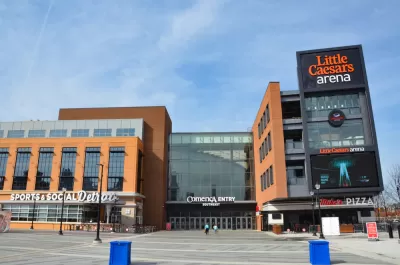In exchange for generous public subsidies, Illitch Holdings, owner and developer of the Little Caesars Arena in Detroit, promised large-scale economic development.

"Just over a year after Little Caesars Arena opened its doors for the first time, Ilitch Holdings is celebrating the changes that have come to Detroit and noted that it's only the beginning," writes John Gallagher.
Gallagher lists the economic development and tax revenue benefits touted by the company, which include, 3 million guests to the arena, $600 million in contracts to local companies and 20,000 jobs, a 456 percent increase in property tax base in the district, 40,000 square feet of additional commercial development, and $200 million in funding commitments to additional redevelopment projects.
Planetizen first reported criticisms of the generous subsidies allowed the sports arena back in 2014, and the public investments continued into 2017. In 2016, the Illitch family has promised that the city's investment in the arena and surrounding sports and entertainment district would reap additional private investments in the area.
FULL STORY: How Little Caesars Arena has changed Detroit

Maui's Vacation Rental Debate Turns Ugly
Verbal attacks, misinformation campaigns and fistfights plague a high-stakes debate to convert thousands of vacation rentals into long-term housing.

Planetizen Federal Action Tracker
A weekly monitor of how Trump’s orders and actions are impacting planners and planning in America.

In Urban Planning, AI Prompting Could be the New Design Thinking
Creativity has long been key to great urban design. What if we see AI as our new creative partner?

King County Supportive Housing Program Offers Hope for Unhoused Residents
The county is taking a ‘Housing First’ approach that prioritizes getting people into housing, then offering wraparound supportive services.

Researchers Use AI to Get Clearer Picture of US Housing
Analysts are using artificial intelligence to supercharge their research by allowing them to comb through data faster. Though these AI tools can be error prone, they save time and housing researchers are optimistic about the future.

Making Shared Micromobility More Inclusive
Cities and shared mobility system operators can do more to include people with disabilities in planning and operations, per a new report.
Urban Design for Planners 1: Software Tools
This six-course series explores essential urban design concepts using open source software and equips planners with the tools they need to participate fully in the urban design process.
Planning for Universal Design
Learn the tools for implementing Universal Design in planning regulations.
planning NEXT
Appalachian Highlands Housing Partners
Mpact (founded as Rail~Volution)
City of Camden Redevelopment Agency
City of Astoria
City of Portland
City of Laramie


























